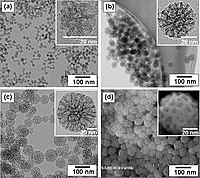
Photo from wikipedia
Abstract For the last two decades, nanostructured carbon materials have attracted significant attention, as they exhibit unusual physicochemical properties different from their bulk counterpart. Nevertheless, agglomeration and re-stacking of carbon… Click to show full abstract
Abstract For the last two decades, nanostructured carbon materials have attracted significant attention, as they exhibit unusual physicochemical properties different from their bulk counterpart. Nevertheless, agglomeration and re-stacking of carbon nanostructures have always limited optimal performance, with larger loading amount. To solve this issue, porous and compressible carbon-based sponges have been researched, but most of the previously suggested carbon foams were either not very porous, synthesized at high temperature heat treatment, and/or not applicable for carbon nanoparticles. In this work, we have successfully fabricated ultra-porous (porosity about 98–99%), polyimide-carbon nanoparticle (PI–C) composites by combining Ketjen black nanoparticles with PI short fibers, by simple freeze-drying and subsequent heat treatments at low temperature (240 °C). Based on the analysis, it has been discovered that the fabricated PI-C sponges not only exhibit highly robust mechanical properties but also retain low thermal conductivity even in comparison with pristine PI sponges. This work provides a milestone in fabricating a number of C-electrospun polymeric sponges by freeze drying and subsequent heat treatments, which are expected to be utilized in various fields of research.
Journal Title: Carbon
Year Published: 2019
Link to full text (if available)
Share on Social Media: Sign Up to like & get
recommendations!